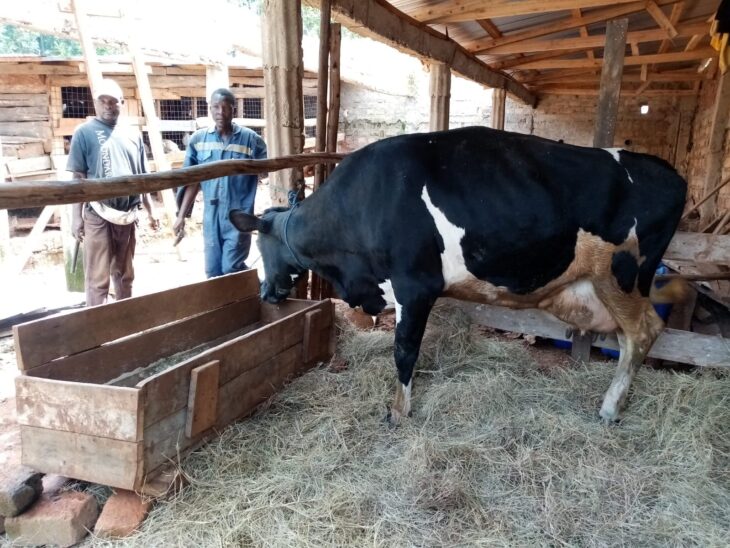KISII, Kenya, Aug 31- Experts say animals need to be fed well with a nutritionally balanced and quality diet with rational and proper food to keep them growing, give quality produce and produce healthy young ones.
In Kenya, animal feed manufacturers are facing a major crisis of high demand from farmers with little supply thus forcing many to import the feed from the neighboring countries for their livestock.
Kenya produces minimal animal feed supplements and small quantities of soya beans meal, sunflower, and cotton seed cake which contain protein, yet this nutrient is significant in the manufacture of animal feeds.
Kenya entirely depends on the import of these animal feeds from Uganda, Tanzania Burundi and Zambia to feed its livestock.
The Association of Kenya Animal Feed Manufacturers (AKEFEMA)whose main goal is to act as a self-regulating body in the feeding milling industry says the average price of raw materials has gone up to 60 percent.
-Animal feed crises-
Speaking during a science café, AKEFEMA secretary General Dr. Martin Kinoti noted with the outbreak of COVID19, the price of grain and graining milling by-products such as wheat, pollard, wheat bran, and Maize bran increased due to a decrease in production globally.
“The reduced volume availability of the international market worsened the local regulatory environment in the sourcing countries and this exposed most counties in East and Central Africa to an extremely high demand of animal raw materials leading to high prices,” said Dr.Kinoti.
Dr. Kinoti further said Kenya’s animal feeds are exposed to challenges whenever most of the Eastern African countries such as Uganda Zambia and Malawi face crises because it largely depends on them for the import of these animal feeds.
-Effects of animal feed crises-
According to AKEFEMA secretary General, animal feed crises have led to the closure of 37 feed manufacturing companies in the past one year due to all-time demand leading to an increase in idle capacity in the feed mills.
“We are experiencing an all-time drop in the number of commercial firms and this has resulted in the loss of regional competitiveness of the Kenyan livestock sector,” said the secretary general.
The manufacturers have written Gazette notices to the government to allow feed millers to source and import nongenetically modified materials.
“Most Major counties have embraced bio-tech products including those that are feeding animals in Kenya, Kenya feed millers were unable to get an offer to import the raw material,” said Dr. Kinoti.
-Recommendation from the feed millers-
Dr. Kinoti says the feed millers want the government to lift the restrictions on GMO material used in animal feed and also asked the government to allow the importation of yellow maize for use in animal feeds.
The millers recommend the government train service providers and farmers on the utilization of traditional materials such as animal feed materials.
“The government should convene a national stakeholder’s meeting to review the role and use of GMO materials in the animal feed sector, “says Dr. Kinoti.
Unga farm care technical representative in south rift Aggrey Abuga says they are currently straining as they provide animal feeds for farmers.
“We are straining due to ongoing crises of not able to get raw materials to produce the feeds,” said Abuga
Abuga said Farmers are not able to purchase from them due to high costs, whatever little they have, they buy at a very high price translating to doubling of price of these feeds.
He noted that previously they used to purchase the soya beans at Sh35 and they are currently buying at Sh135.
They have resulted in educating farmers and giving them premixes and formulating protein and carbohydrates to produce their own.
“Most countries which produce GMO materials are currently having a crisis due to Covid19 and whatever pockets they want to sustain themselves before selling to us,” said Abuga.
He asked the government to introduce contracting large pieces of land for private use to produce its own soya, wheat, and yellow maize for its farmers.
Abuga said a Bag of maize goes is currently purchased at Sh6000 for production from the initial price of Sh4,000 doubling the price of a daily meal from Sh1500 to Sh3,000 and this has strained the farmers because they can’t double the price of milk.
Esther Kerubo, a dairy farmer in Kisii says she was not able to take care of her four daily cows due to the high price of daily meals and she resolved to sell two cows to make it easy to feed the remaining.
She points out that it’s not easy to provide daily meals, cows, goats, and poetry as feeds have doubled forcing her to resolve to locally made feeds, and this has affected production.
“I used to get 20 liters of milk per day because of the healthy and available feeds from the millers but now am getting 14 liters a day because I can’t afford the daily meals whose price has gone up,” says Kerubo.
Kerubo has shifted from commercial to locally made feeds which have reduced production and now she is thinking of opening a clothing shop to sustain her family.
Want to send us a story? Contact Shahidi News Tel: +254115512797 (Mobile & WhatsApp)


